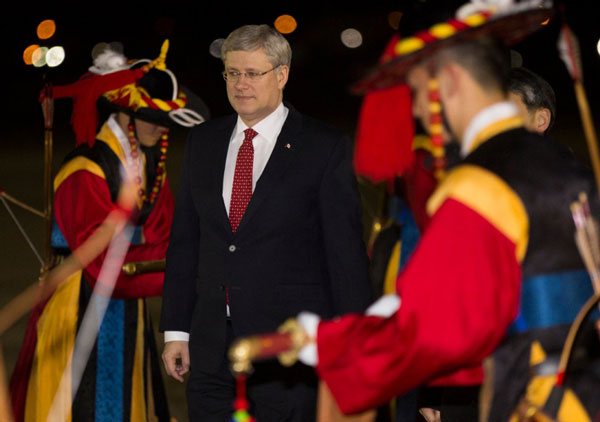
Stephen Harper announced a new free-trade agreement in South Korea on Tuesday. Courtesy the Office of the Prime Minister
By Joshua Sherman
The federal government has announced a new free-trade agreement with South Korea.
The agreement on Tuesday will result in the removal of 98.2 per cent of South Korea’s tariffs, which are currently three times higher on average than Canada’s, according to Prime Minister Stephen Harper’s website.
“The Canada-Korea Free Trade Agreement will create jobs and open the door to the lucrative Asia-Pacific market for Canadian businesses,” said Harper in a news release Tuesday.
“Canadian businesses, investors and consumers in every province stand to benefit significantly from the increased market access that the Agreement will provide,” he said.
The federal government projects the agreement to bolster exports by 32 per cent, while leading to an annual windfall of $1.7 billion for the economy.
The Forest Products Association of Canada was supportive of the agreement, which eliminates duties on wood, pulp, and paper products.
“We really appreciate anything that allows us access to markets,” said Susan Murray, a spokesperson for the association.
Murray emphasized the importance of Asian markets to the wood product industry, especially after the housing market collapse of 2008-2009 resulted in less exports heading south of the border.
She said a reduction of tariffs in Korea will help companies tap in to the Asian market, noting Korea alone imported more than $6 billion worth of wood products last year.
“We’re hoping for more free trade deals with that area of the world,” said Murray.
However, not all industry representatives were in favour of the agreement.
Unifor, a Canadian union that has over 300,000 private-sector members, expressed concerns that the deal will hurt Canada’s auto industry in particular and the manufacturing industry as a whole.
Listen to Unifor spokesperson Angelo DiCaro’s reaction to the free-trade deal:
“What we worry is that what this will result in is just an increased flood of Korean cars and still very little opportunity and access for us to sell back into the Korean market,” Unifor spokesperson Angelo DiCaro told Humber News.
For the auto industry, tariffs aren’t necessarily the issue, DiCaro said. Instead, there are foreign-market regulations hampering Canadian auto exports, and the agreement doesn’t address these regulations, he said.
“There’s a whole series of what are called non-tariff barriers,” DiCaro explained, citing examples of South Korean safety and fuel economy regulations that he said are designed strategically to favour domestic car companies.
“Korea still has full flexibility to do a lot of what they’re doing on the regulatory side that would prevent our cars from coming in,” he said.
The agreement could also put Canadian jobs at risk, said DiCaro, citing Unifor research that shows some 33,000 jobs could be lost as a result of this kind of free-trade agreement.
Traditionally, he said, the trade relationship between the two countries has been one where Canada sends natural resources including oil and minerals and is sent manufactured goods such as cars and electronics.
The Canada-Korea Free Trade Agreement will only further entrench this pattern of trade, with potentially harmful implications for Canada’s manufacturing industry as it plays a lessened role, he said.
“If that’s the current relationship, and then you want to eliminate the lion’s share of tariffs that are in place – which make it easier and encourage more trade in those areas – there’s only one real way that you can view that,” he said.
“Whatever the imbalances are now will simply just exacerbate,” he said.

